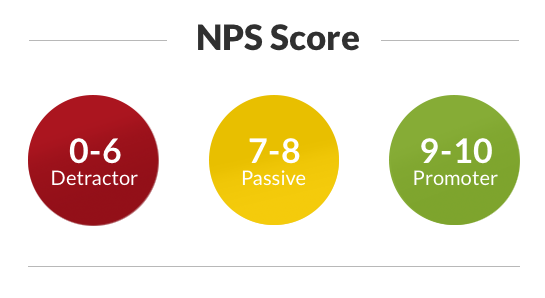They say that some of the best marketing you can do is via word of mouth. What do people really think about you? What are they saying to their friends, families, and coworkers? When a portion of your sales relies on repeat clients and referrals, you need to know.
NPS
The Net Promoter Score, NPS, was created for just this purpose. Using it, you can get a good temperature on your relationships – positive or negative. To get this score you need to ask only one simple question: “On a scale of 0-10, how likely are you to refer us to your friends/family/coworkers?”
The NPS Scale
The scale is simple. A score of 0-6 is considered a detractor. These are people who may actively be going out of their way to speak negatively about you. 7 or 8 is considered passive. They are indifferent and have no particular loyalty. Getting a 9 or 10 means the person is a promoter and is likely singing your praises from the rooftops!
Once you have all of your scores, you will need to do some math to get your final NPS. Take the percentage of promoters and subtract the percentage of detractors. What about the passives you ask? They are like bystanders and only add to the total number of people you divide by.

My NPS Score
For science, I have asked several of my coworkers to rate me. While I attempted to ask a range of people, I didn’t get any detractor scores. That’s good news for me, bad news for this example. So, I am going to invent a couple of haters. Here are the results:
Promoters: 6
Passives: 3
Detractors: 2
(6/11-2/11)*100 = 36
A score of 36 may sound very low because we tend to think of a scale of 0-100. With NPS, the range is between -100 (all detractors) and +100 (all promoters). Any score in the positives means you have more promoters than detractors, which is a step in the right direction. Getting a score above 50 is considered excellent. Without my imaginary detractors, my score would be 67. Awesome.
NPS at Metova
We use NPS to measure both our “internal” clients (our employees) and “external” clients (our customers). Every quarter, Metova sends out a survey to both sets of parties asking if they would recommend us. Because emotions and projects are always changing, we consider NPS scores expired after 3 months if they haven’t been updated.
Metova thinks of measurements, such as NPS, as tools. They are simply indicators and aren’t inherently good or evil. If a client becomes a detractor, it is a sign that we may need to look into the events of the previous months, talk with the client, or talk with the developer. Once we have more information and can better understand the situation, we can work to improve it.
We care about our relationships with our clients and our employees. We’re all a team and by measuring satisfaction with NPS, we can learn what areas and people need additional attention.



